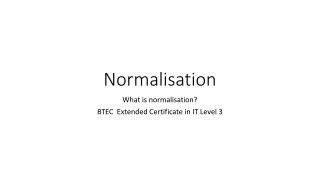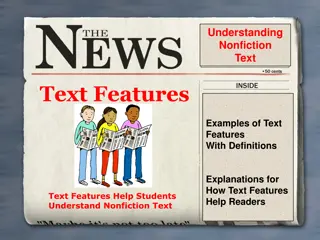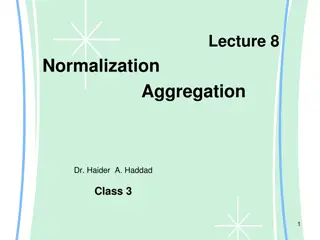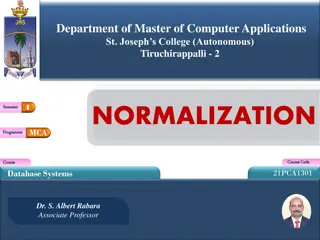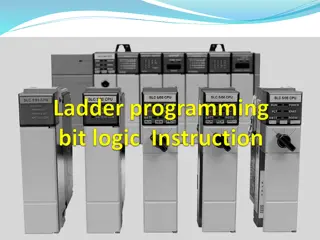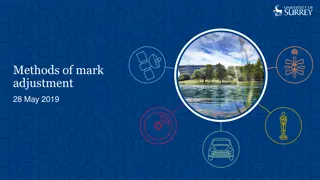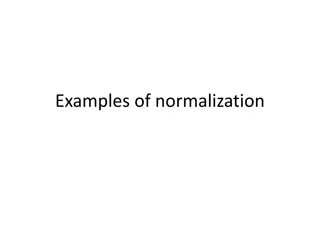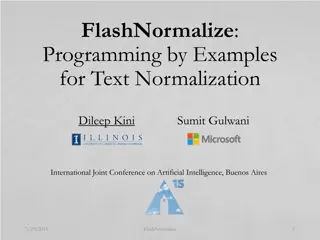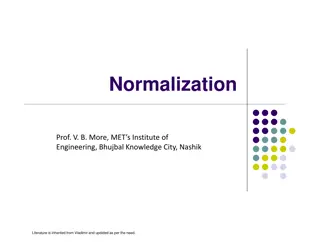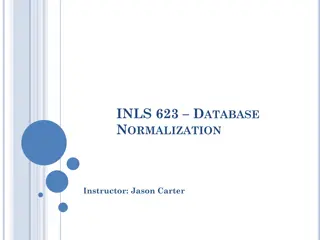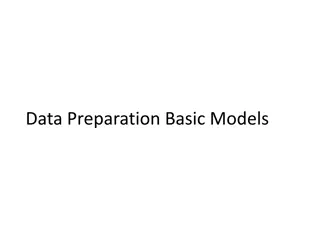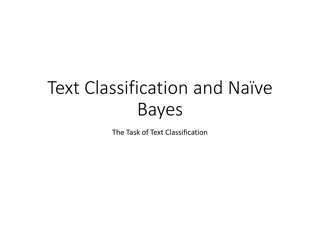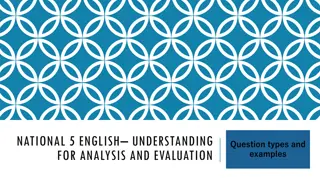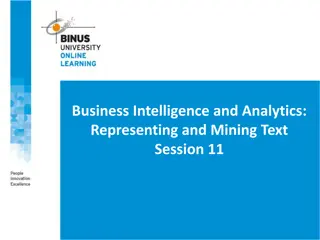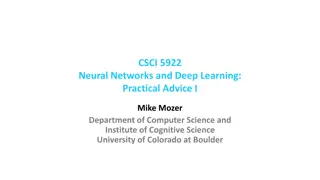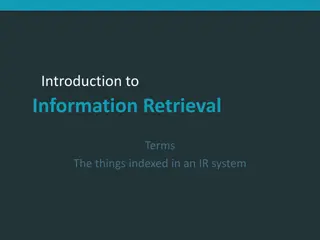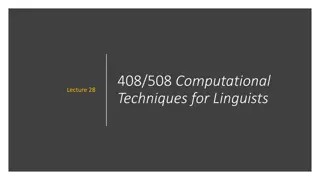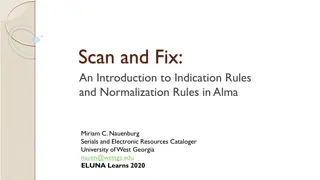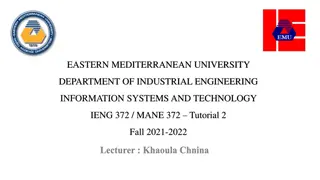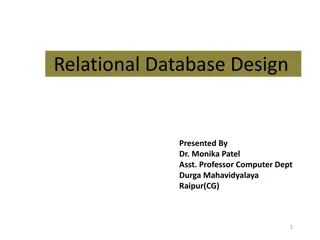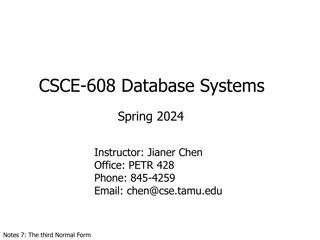Normalisation
Explore databases in detail and understand normalization. Learn how to structure data efficiently in databases for optimal performance. Research and discuss the importance of normalization.
1 views • 20 slides
CS 404/504 Special Topics
Adversarial machine learning techniques in text and audio data involve generating manipulated samples to mislead models. Text attacks often involve word replacements or additions to alter the meaning while maintaining human readability. Various strategies are used to create adversarial text examples
1 views • 57 slides
Building a local facet in Primo VE for Decolonization work
Explore the process of adding publisher/place of publication as a search parameter in Library Search, with insights on using MARC fields, establishing normalization rules, and steps to enable and translate local fields for effective faceted searching in Primo VE. Learn about the nuances of field rec
0 views • 19 slides
Understanding Translation: Key Concepts and Definitions
Translation involves transferring written text from one language to another, while interpreting deals with oral communication. Etymologically, the term "translation" comes from Latin meaning "to carry over." It is a process of replacing an original text with another in a different language. Translat
11 views • 76 slides
fMRI Coregistration and Spatial Normalization Methods
fMRI data analysis involves coregistration and spatial normalization to align functional and structural images, reduce variability, and prepare data for statistical analysis. Coregistration aligns images from different modalities within subjects, while spatial normalization achieves precise anatomic
3 views • 35 slides
Coregistration and Spatial Normalization in fMRI Analysis
Coregistration and Spatial Normalization are essential steps in fMRI data preprocessing to ensure accurate alignment of functional and structural images for further analysis. Coregistration involves aligning images from different modalities within the same individual, while spatial normalization aim
6 views • 42 slides
Understanding Text Features in Nonfiction Texts
Text features are essential components of nonfiction texts that authors use to enhance reader comprehension. They include elements such as tables of contents, indexes, glossaries, and titles, each serving a unique purpose in aiding readers to navigate and understand the content. By utilizing these t
1 views • 15 slides
Database Normalization and Aggregation Concepts
Understanding the advantages and disadvantages of database normalization, the concept of aggregation in the ER model, and examples of creating ER diagrams using aggregation rules with related entities. Explore the benefits of smaller databases and better performance through normalization, and how ag
4 views • 11 slides
Understanding Database Normalization and Functional Dependencies
Database normalization is a crucial process that aims to improve database design by organizing data into higher forms of normality. This helps in reducing redundancy and ensuring data integrity. Functional dependencies play a key role in defining relationships between attributes in a database. By un
0 views • 33 slides
Unique Sample Text Images Collection for Creative Projects
Create captivating visuals with this diverse collection of sample text images. From customizable text layouts to percentage displays, this set offers a range of design elements to elevate your creative projects. Explore different styles, colors, and compositions to enhance your presentations, websit
7 views • 10 slides
Introduction to Structured Text in PLC Programming
Structured text is a high-level text language used in PLC programming to implement complex procedures not easily expressed with graphical languages. It involves logical operations, ladder diagrams, and efficient control logic for industrial automation. Concepts such as sensor input, logic operation
5 views • 23 slides
Methods of Mark Adjustment in Educational Assessment
In educational assessment, methods like Z-score normalization, quadratic scaling, and piecewise linear scaling are used to adjust marks based on Gaussian distribution assumptions. Z-score normalization helps to adjust both mean and standard deviation, impacting the distribution of marks. Quadratic s
4 views • 25 slides
Understanding Database Normalization Process
Database normalization is a crucial process that helps in organizing data efficiently by reducing redundancy and dependency issues. It involves steps like identifying keys, removing repeating attributes, and transforming data into different normal forms. Each step aims to enhance data integrity and
0 views • 19 slides
Understanding Functional Skills: Text Analysis and Application
This instructional text guides learners through the purpose of functional skills in analyzing different types of text, such as skimming and scanning, and understanding the features of various text genres. It includes activities to practice skimming, scanning, and detailed reading, with a focus on de
0 views • 13 slides
Enhancing Accessibility Through Alternate Text in Microsoft Documents
Explore the importance of alternate text in Microsoft documents for accessibility. Learn what alternate text is, why and when you should use it, and how to add it effectively. Discover the benefits of incorporating alternate text and the legal aspects related to accessibility under Section 508. Enha
0 views • 23 slides
Advancements in Open Question Answering Over Text and Tables
Open question answering over tables and text is a challenging area in natural language processing. Various paradigms such as text-based QA, table/KB-only QA, and combined text and table QA have been explored. Incompleteness in answering specific questions like identifying the runner-up song on Billb
0 views • 24 slides
FlashNormalize: Programming by Examples for Text Normalization
Text normalization is essential for converting non-standard words like numbers, dates, and currencies into consistently formatted variants. FlashNormalize offers a programming-by-examples approach for accurate normalization, addressing challenges posed by traditional manual methods and statistical t
6 views • 14 slides
Understanding Normalization in Database Management
Normalization is a crucial database design technique used to organize tables efficiently, reduce data redundancy, and prevent anomalies in data operations. This process involves decomposing larger tables into smaller, linked tables to ensure consistency and ease of data management.
1 views • 59 slides
Database Normalization: Understanding Sets and Normal Forms
Explore the importance of set theory in database design, learn about different types of sets, subsets, and supersets, understand the basics of normalization techniques to efficiently organize data in databases, and discover the common anomalies associated with unnormalized databases.
0 views • 26 slides
Understanding Data Preparation in Data Science
Data preparation is a crucial step in the data science process, involving tasks such as data integration, cleaning, normalization, and transformation. Data gathered from various sources may have inconsistencies in attribute names and values, requiring uniformity through integration. Cleaning data ad
1 views • 50 slides
Text Classification and Nave Bayes: The Power of Categorizing Documents
Text classification, also known as text categorization, involves assigning predefined categories to free-text documents. It plays a crucial role in organizing and extracting insights from vast amounts of unstructured data present in enterprise environments. With the exponential growth of unstructure
0 views • 28 slides
Understanding Audience and Purpose in Text Analysis
When analyzing written texts, identifying the purpose and audience is crucial. The purpose reflects the reason behind the text, while the audience indicates who the text is intended for. By recognizing these aspects, one can better understand the content, language, and overall impact of the text. Va
1 views • 50 slides
Essential Information on Text-to-911 System
Explore key details about the text-to-911 system, including capturing text conversations, handling abandoned calls, transferring text calls to queues, and managing text conversations effectively. Learn about system configurations, call release timings, and dispatcher capabilities in handling text me
0 views • 12 slides
Text-to-911 System Operations Quiz
Test your knowledge on Text-to-911 system operations with this quiz. Learn about capturing text conversations, handling abandoned calls, transferring calls to queues, text conversation timelines, and more. Enhance your understanding of the protocols and procedures involved in managing text-based eme
1 views • 12 slides
Effect of Normalization of Relations with Cuba on Georgia
The normalization of relations with Cuba has had significant effects in Georgia, particularly in terms of diplomatic relations, trade embargo laws, and trade relations. This includes a look at the naming of ambassadors, the importance of diplomatic relations, trade restrictions with various countrie
0 views • 8 slides
Understanding Database Normalization: A Comprehensive Guide
Database normalization is a crucial process in database design to eliminate data redundancy and anomalies. This guide covers the definition of normalization, types of normalization including 1NF, 2NF, and more, along with examples and explanations on achieving each normalization form.
1 views • 22 slides
Understanding Database Normalization Techniques
Database normalization is a crucial technique for organizing data efficiently to eliminate redundancy and anomalies. It involves decomposing tables to ensure data integrity and minimize inconsistencies. Common issues without normalization include excessive memory usage and data manipulation problems
4 views • 21 slides
Understanding Text Representation and Mining in Business Intelligence and Analytics
Text representation and mining play a crucial role in Business Intelligence and Analytics. Dealing with text data, understanding why text is difficult, and the importance of text preprocessing are key aspects covered in this session. Learn about the goals of text representation, the concept of Bag o
0 views • 27 slides
Best Practices in Neural Network Initialization and Normalization
This resource provides practical advice on input normalization, weight initialization, Xavier normalization, and Glorot/Bengio normalization in neural networks. Tips include the importance of controlling the range of net inputs, setting initial weights appropriately, and understanding the rationale
0 views • 15 slides
Introduction to JMP Text Explorer Platform: Unveiling Text Exploration Tools
Discover the power of JMP tools for text exploration with examples of data curation steps, quantifying text comments, and modeling ratings data. Learn about data requirements, overall processing steps, key definitions, and the bag of words approach in text analysis using Amazon gourmet food review d
0 views • 23 slides
Understanding Information Retrieval Techniques
Information retrieval involves various techniques such as stop words exclusion, normalization of terms, language-specific normalization like accents and date forms, and case folding to enhance search efficiency. These methods aim to improve query matching by standardizing and optimizing indexed text
0 views • 9 slides
Understanding Batch Normalization in Neural Networks
Batch Normalization (BN) is a technique used in neural networks to improve training efficiency by reducing internal covariate shift. This process involves normalizing input data to specific ranges or mean and variance values, allowing for faster convergence in optimization algorithms. By standardizi
0 views • 18 slides
Understanding Bigrams and Generating Random Text with NLTK
Today's lecture in the Computational Techniques for Linguists course covered the concept of bigrams using NLTK. Bigrams are pairs of words found in text, which are essential for tasks like random text generation. The lecture demonstrated how to work with bigrams, including examples from the NLTK boo
0 views • 19 slides
Scan and Fix: Indication and Normalization Rules in Alma
Introduction to indication rules and normalization rules in Alma Miriam C. Nauenburg's presentation on the scan and fix workflow. Learn about creating and applying indication and normalization rules, testing rules in the Metadata Editor, and organizing rules as private or shared.
0 views • 54 slides
Enhancing Reading Comprehension Through Text-Dependent Questions
This resource delves into the significance of text-dependent questions in improving students' reading comprehension skills by emphasizing the importance of evidence from the text, building knowledge through nonfiction, and developing critical thinking abilities. It highlights key advances in educati
0 views • 16 slides
E-R Diagram and Normalization Analysis for Online Telephone Sales System
This content provides detailed information on the creation of an information system for tracking orders in an online telephone sales company. It includes system requirements, entity identification, attribute listing, relationship identification, and normalization analysis for second and third normal
0 views • 10 slides
Understanding Discriminative Normalization Flow in Machine Learning
Explore the intricacies of Discriminative Normalization Flow (DNF) and its role in preserving information through various models like NF and PCA. Delve into how DNF encoding maintains data distribution and class information, providing insights into dimension reduction and information preservation in
0 views • 23 slides
Understanding Relational Database Design Fundamentals
This content delves into the crucial aspects of relational database design, including normalization, pitfalls, RDBMS design issues, and the overall database design process. It emphasizes the need for well-structured relation schemas to minimize redundancy, ensure data integrity, and facilitate effic
1 views • 53 slides
Enhancing Arabic Sentiment Analysis Using Fuzzy Logic Approach
Presenter Mariam Biltawi from Princess Sumaya University for Technology in Jordan discusses a research project on enhancing automatic polarity classification of Arabic text using a lexicon-based approach with fuzzy logic. The project utilizes a large-scale Arabic book reviews dataset and a sentiment
1 views • 30 slides
Understanding Database Normalization and BCNF in Database Systems
Learn about the process of database development, including E-R diagrams, converting to relations, developing database operations, normalization, and BCNF. Explore algorithms for achieving BCNF and example scenarios to understand key concepts in database systems.
0 views • 43 slides
